Eco-Friendly Tableware: Sustainable Solutions for Every Celebration
Eco-Friendly Tableware: Sustainable Solutions for Every Celebration
Introduction: Why Eco-Friendly Tableware Matters:

Every celebration, whether it is a wedding, a temple function, a corporate event, or a casual picnic, involves food. But along with food comes the responsibility of choosing how it is served. For decades, plastic and styrofoam disposables have been used for convenience, yet these items remain in landfills and oceans for hundreds of years, polluting soil, contaminating water, and endangering wildlife. Eco-friendly tableware offers a sustainable alternative that not only meets the modern requirements of hygiene, strength, and affordability but also connects us back to our cultural traditions. By switching to natural, biodegradable dining solutions, we reduce plastic waste, conserve resources, and inspire a lifestyle rooted in responsibility toward the planet.
Every celebration, whether it is a wedding, a temple function, a corporate event, or a casual picnic, involves food. But along with food comes the responsibility of choosing how it is served. For decades, plastic and styrofoam disposables have been used for convenience, yet these items remain in landfills and oceans for hundreds of years, polluting soil, contaminating water, and endangering wildlife. Eco-friendly tableware offers a sustainable alternative that not only meets the modern requirements of hygiene, strength, and affordability but also connects us back to our cultural traditions. By switching to natural, biodegradable dining solutions, we reduce plastic waste, conserve resources, and inspire a lifestyle rooted in responsibility toward the planet.
What Are Eco-Friendly Tableware Products?
Eco-friendly tableware products are crafted from natural, renewable, and biodegradable materials. They represent a revolution in dining essentials, offering plates, bowls, cups, and cutlery that safely decompose without leaving toxic residues. Unlike plastic or styrofoam, which can take centuries to break down, these products return to the soil within months, enriching the environment instead of harming it.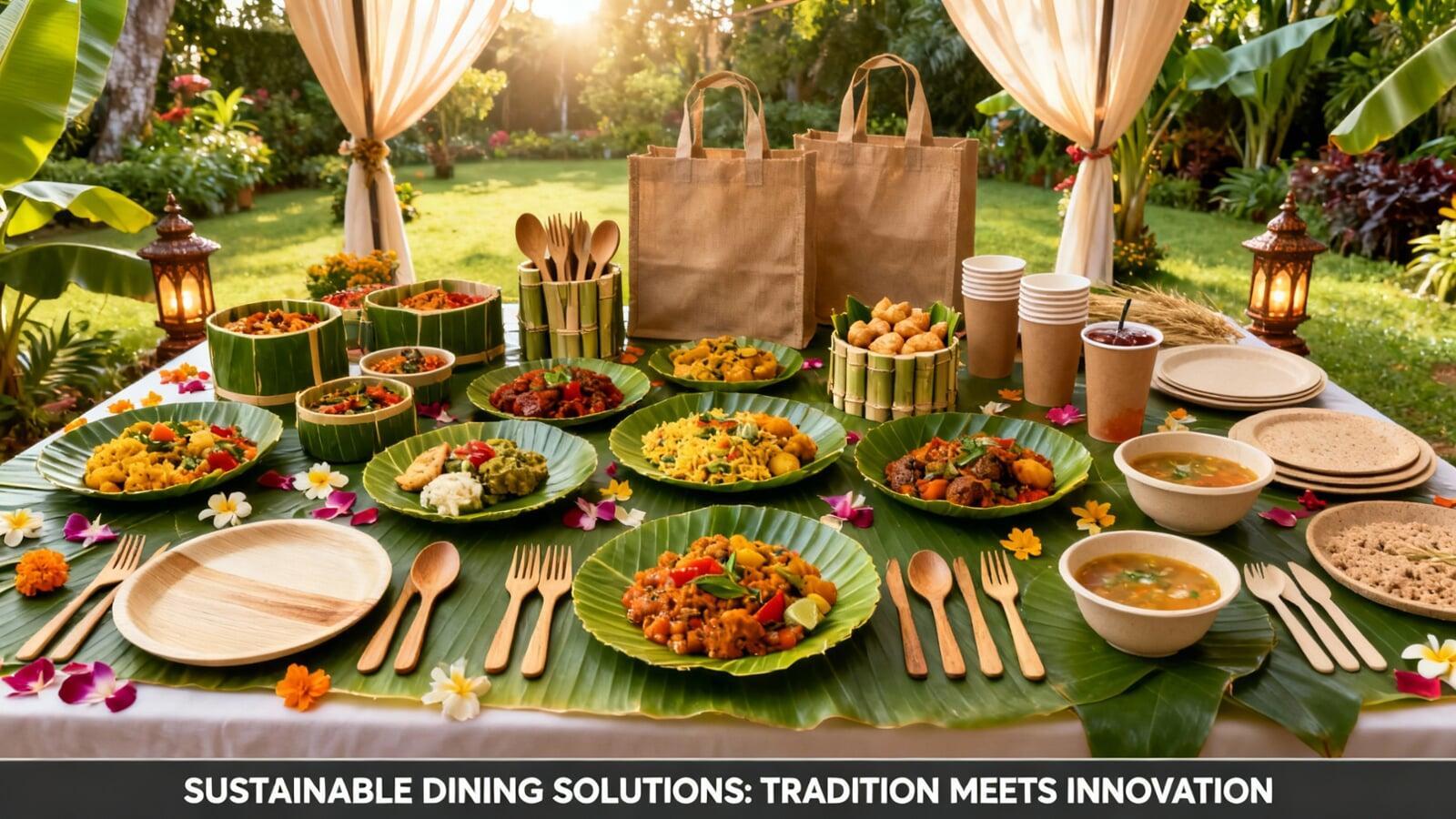
Among the most popular options are areca leaf plates, which are made by collecting naturally fallen palm sheaths and pressing them into strong, elegant plates. Wooden spoons and forks are created from sustainably harvested wood and provide durability without plastic waste. Traditional containers such as leaf dhonnai, widely used in South India, are perfect for prasadam or snacks, while sugarcane bagasse, the fibrous by-product left after extracting juice, is transformed into versatile plates, bowls, and trays. Bio paper cups provide a safe, compostable alternative for both hot and cold drinks, and bio carry bags replace plastic bags with plant-based options that can safely degrade. Globally, more innovations are emerging, including wheat bran plates that are edible, cornstarch-based cutlery, and palm leaf bowls shaped for soups and gravies.
By merging traditional methods with modern technology, eco-friendly tableware delivers both functionality and sustainability in a single solution.

Among the most popular options are areca leaf plates, which are made by collecting naturally fallen palm sheaths and pressing them into strong, elegant plates. Wooden spoons and forks are created from sustainably harvested wood and provide durability without plastic waste. Traditional containers such as leaf dhonnai, widely used in South India, are perfect for prasadam or snacks, while sugarcane bagasse, the fibrous by-product left after extracting juice, is transformed into versatile plates, bowls, and trays. Bio paper cups provide a safe, compostable alternative for both hot and cold drinks, and bio carry bags replace plastic bags with plant-based options that can safely degrade. Globally, more innovations are emerging, including wheat bran plates that are edible, cornstarch-based cutlery, and palm leaf bowls shaped for soups and gravies.
By merging traditional methods with modern technology, eco-friendly tableware delivers both functionality and sustainability in a single solution.
Environmental Protection and Sustainability:
The shift toward eco-friendly tableware is a direct response to the environmental crisis caused by conventional disposables. Plastic plates and cutlery can take up to 500 years to decompose, while styrofoam never completely disappears. Instead, it breaks down into tiny microplastics that infiltrate soil and water and eventually enter the food chain. Even traditional paper cups and plates often contain harmful chemical linings that prevent them from decomposing fully.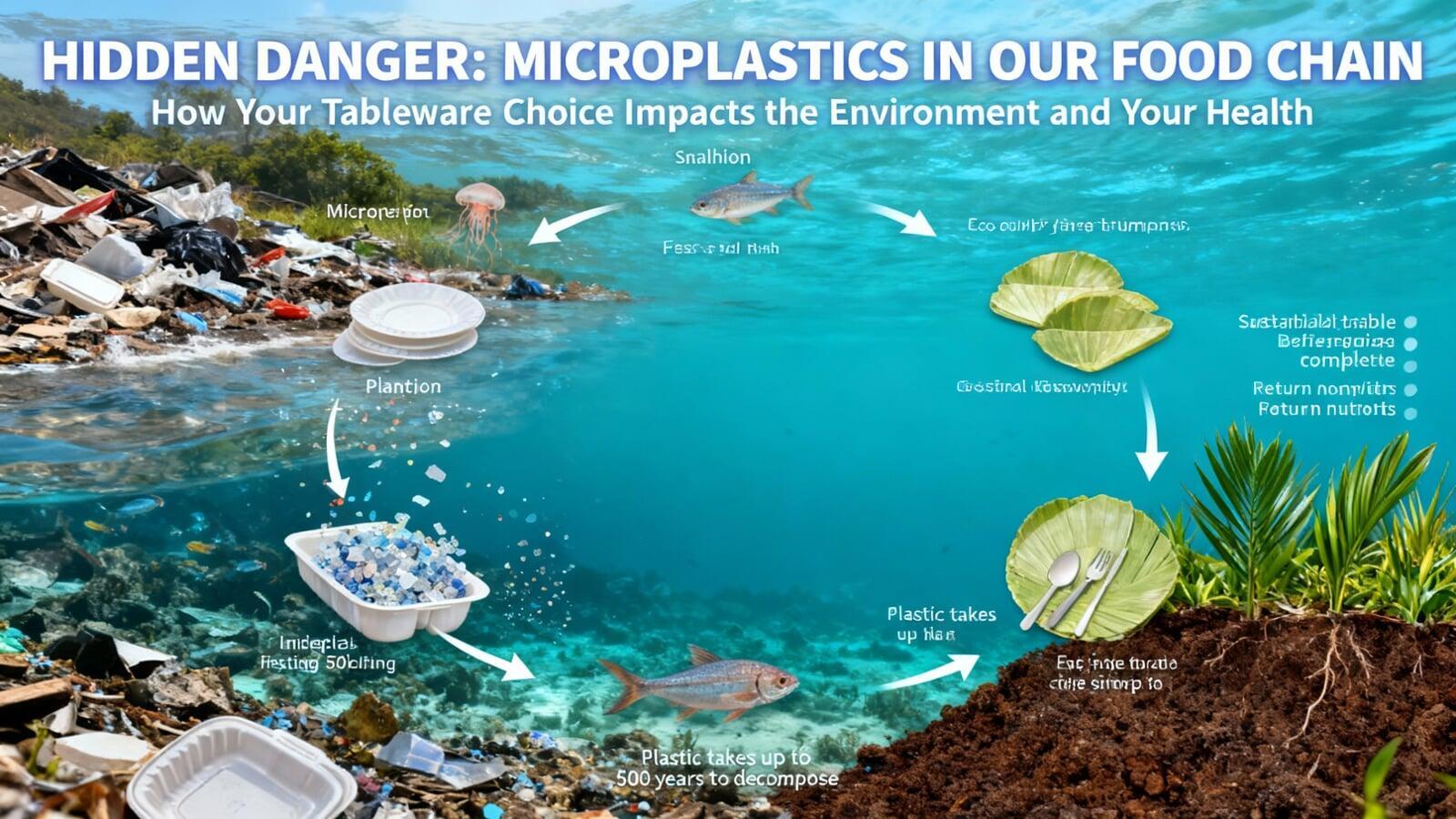
Eco-friendly tableware addresses these issues with multiple advantages. Since they are made from agricultural by-products such as leaves and sugarcane bagasse, they are fully biodegradable within two to six months. They leave behind no toxins and generate zero waste. Because no harmful bleaches, coatings, or chemicals are used, they are completely safe for the environment. Manufacturing these products also consumes far less water and energy compared to petroleum-based plastics, which means their overall carbon footprint is significantly reduced. Furthermore, their use supports the principles of the circular economy, where agricultural waste is repurposed into a valuable resource instead of being burned or discarded. Globally, more than 170 countries have pledged to phase out single-use plastics by 2030, and adopting biodegradable tableware aligns perfectly with this worldwide mission.

Eco-friendly tableware addresses these issues with multiple advantages. Since they are made from agricultural by-products such as leaves and sugarcane bagasse, they are fully biodegradable within two to six months. They leave behind no toxins and generate zero waste. Because no harmful bleaches, coatings, or chemicals are used, they are completely safe for the environment. Manufacturing these products also consumes far less water and energy compared to petroleum-based plastics, which means their overall carbon footprint is significantly reduced. Furthermore, their use supports the principles of the circular economy, where agricultural waste is repurposed into a valuable resource instead of being burned or discarded. Globally, more than 170 countries have pledged to phase out single-use plastics by 2030, and adopting biodegradable tableware aligns perfectly with this worldwide mission.
Cultural and Traditional Significance:
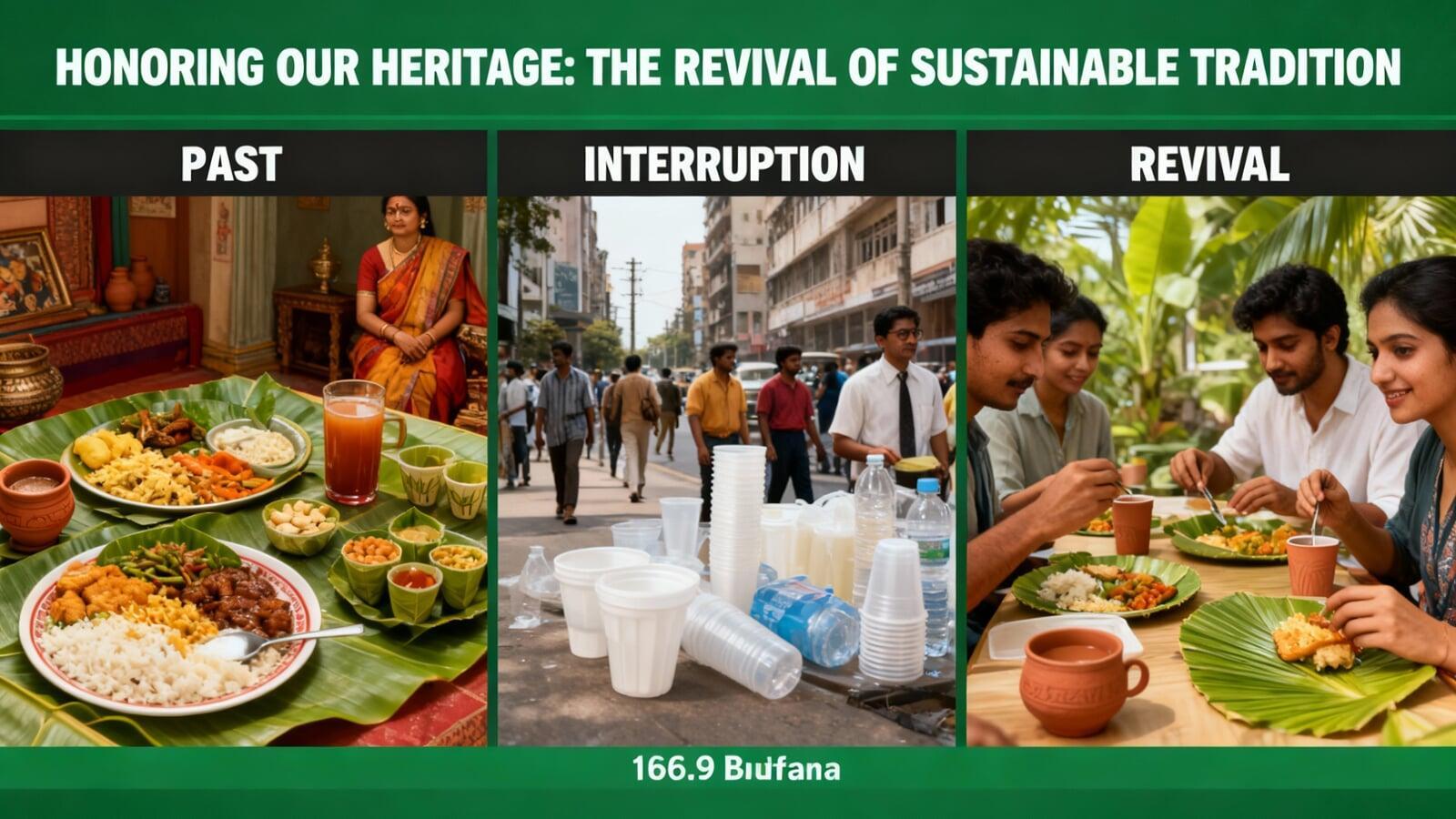
Eco-friendly tableware is not only a modern innovation but also a revival of age-old traditions. For centuries in India, food has been served on banana leaves, dhonnai cups, and clay kulhads. These practices were inherently sustainable, yet over time they were replaced by plastics for convenience. By bringing back natural serving materials, we honor our heritage and connect to the indigenous knowledge of sustainable living.
In temple ceremonies and religious functions, serving prasadam in leaf dhonnai is still considered pure and respectful. Similarly, weddings and festivals become more authentic when food is presented in natural plates and cups. This combination of cultural significance and ecological responsibility makes eco-friendly tableware not just a practical choice but a symbolic one as well.

Eco-friendly tableware is not only a modern innovation but also a revival of age-old traditions. For centuries in India, food has been served on banana leaves, dhonnai cups, and clay kulhads. These practices were inherently sustainable, yet over time they were replaced by plastics for convenience. By bringing back natural serving materials, we honor our heritage and connect to the indigenous knowledge of sustainable living.
In temple ceremonies and religious functions, serving prasadam in leaf dhonnai is still considered pure and respectful. Similarly, weddings and festivals become more authentic when food is presented in natural plates and cups. This combination of cultural significance and ecological responsibility makes eco-friendly tableware not just a practical choice but a symbolic one as well.
Health Benefits of Eco-Friendly Tableware:
One of the strongest reasons to adopt eco-friendly tableware lies in health protection. Plastic plates and cups often leach harmful chemicals such as BPA, phthalates, and styrene into food, especially when they come into contact with hot curries, oily foods, or beverages. These chemicals are linked to hormonal imbalance, reproductive issues, and even certain cancers. Styrofoam, when exposed to heat, can release toxins that are hazardous to human health.
Eco-friendly tableware, on the other hand, is completely non-toxic. Areca leaf plates, sugarcane bagasse products, and wooden cutlery contain no artificial chemicals, and they do not leach harmful substances even when used with steaming hot or spicy food. Many products are microwave-safe, allowing safe reheating without the risk of toxin release. Natural antimicrobial qualities of materials like areca leaves also help resist bacterial growth, making the tableware not just safe but hygienic. Another advantage is that food tastes better on natural plates, since they do not leave behind an artificial aftertaste like plastics often do.
Eco-friendly tableware, on the other hand, is completely non-toxic. Areca leaf plates, sugarcane bagasse products, and wooden cutlery contain no artificial chemicals, and they do not leach harmful substances even when used with steaming hot or spicy food. Many products are microwave-safe, allowing safe reheating without the risk of toxin release. Natural antimicrobial qualities of materials like areca leaves also help resist bacterial growth, making the tableware not just safe but hygienic. Another advantage is that food tastes better on natural plates, since they do not leave behind an artificial aftertaste like plastics often do.
Practical Advantages for Everyday Use:
Eco-friendly tableware is not only sustainable but also practical in terms of performance. They are sturdy enough to handle heavy meals, oily gravies, and hot food without bending, melting, or leaking. Plates made from areca and sugarcane bagasse are leak-proof and heat-resistant, making them suitable for both traditional feasts and modern buffets. Unlike flimsy paper plates, they preserve the natural flavor of food and add elegance to the presentation.
They are also lightweight, easy to transport, and stackable for efficient storage. Since they are disposable yet eco-conscious, they eliminate the need for washing, which saves large amounts of water and labor after big functions. For organizers, this means less stress and faster cleanup without compromising environmental responsibility.
They are also lightweight, easy to transport, and stackable for efficient storage. Since they are disposable yet eco-conscious, they eliminate the need for washing, which saves large amounts of water and labor after big functions. For organizers, this means less stress and faster cleanup without compromising environmental responsibility.
Benefits for Humans and Society:
For individuals, eco-friendly tableware enhances the dining experience with rustic charm and natural textures. For event organizers and businesses, they bring economic advantages. As production expands, prices have become increasingly competitive, and bulk discounts make them cost-effective for weddings, temples, and corporate gatherings. Cleanup costs are minimized, and water and labor savings make them even more affordable.From a branding perspective, businesses that adopt sustainable products demonstrate responsibility toward the environment. This improves their image and aligns with customer values. On a larger scale, the eco-friendly tableware industry provides employment opportunities in rural areas where raw materials are sourced. Artisans skilled in pressing, molding, and crafting these products gain livelihoods, while traditional techniques are preserved for future generations. Many producers also follow fair trade practices, ensuring ethical treatment of workers.
For individuals, eco-friendly tableware enhances the dining experience with rustic charm and natural textures. For event organizers and businesses, they bring economic advantages. As production expands, prices have become increasingly competitive, and bulk discounts make them cost-effective for weddings, temples, and corporate gatherings. Cleanup costs are minimized, and water and labor savings make them even more affordable.From a branding perspective, businesses that adopt sustainable products demonstrate responsibility toward the environment. This improves their image and aligns with customer values. On a larger scale, the eco-friendly tableware industry provides employment opportunities in rural areas where raw materials are sourced. Artisans skilled in pressing, molding, and crafting these products gain livelihoods, while traditional techniques are preserved for future generations. Many producers also follow fair trade practices, ensuring ethical treatment of workers.
Benefits for Nature and the Planet:
Eco-friendly tableware contributes to environmental sustainability in multiple ways. They reduce waste by being fully compostable. Many products can break down in home composting systems within two to three months, while in commercial composting they often degrade within just 60 days. Unlike plastics, they do not create microplastics that threaten ecosystems.
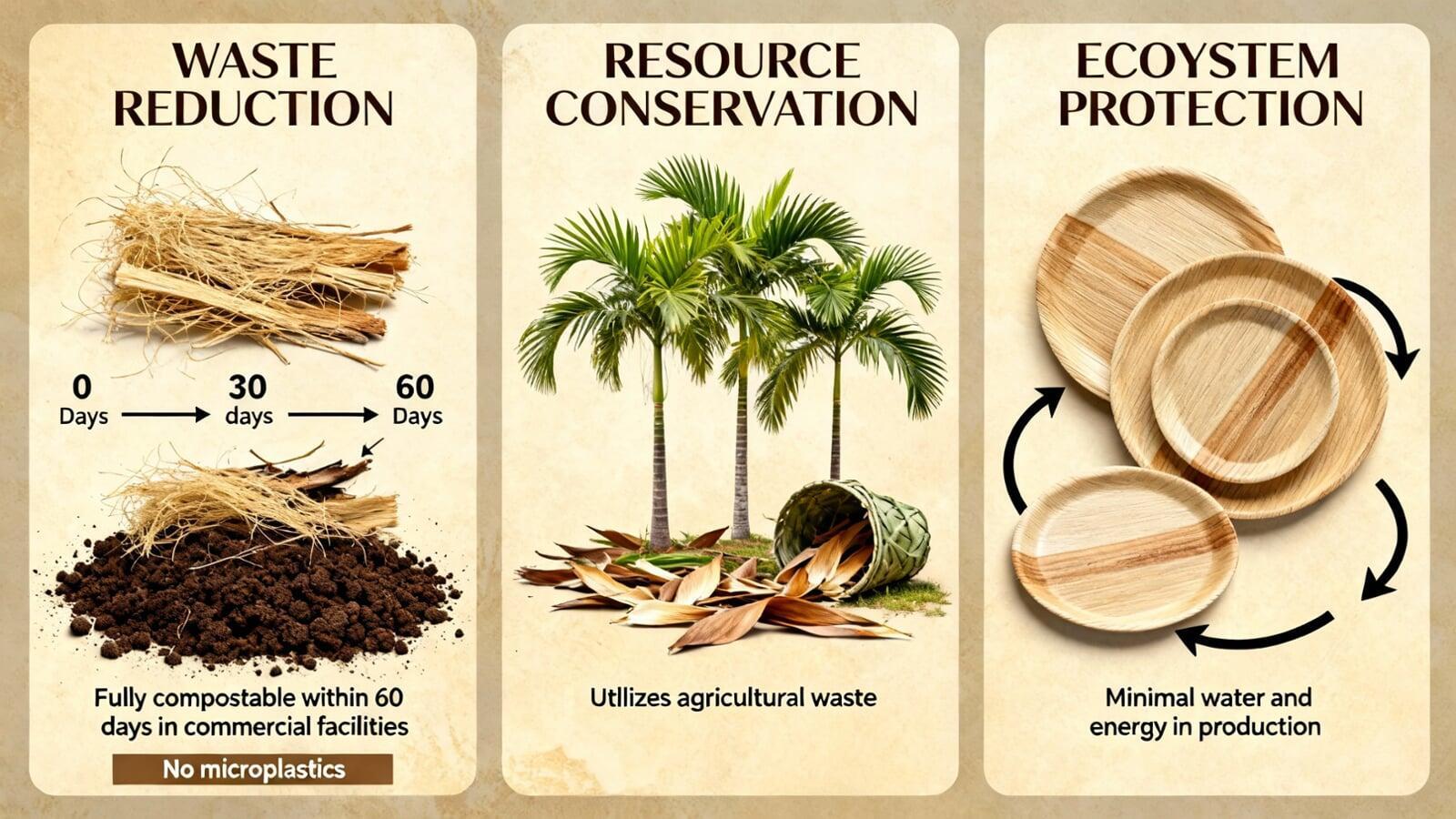
They also conserve resources. Agricultural waste such as sugarcane bagasse and areca sheaths, which might otherwise be burned, are given new life. This prevents air pollution and makes production highly resource-efficient. Manufacturing processes require minimal water and energy, reducing strain on natural reserves. In terms of ecosystem protection, these products avoid the toxic runoff associated with plastics and reduce marine waste, which currently kills millions of seabirds and thousands of marine animals every year.
Most importantly, they help combat climate change. Plant-based materials absorb carbon dioxide during growth, and their production generates fewer greenhouse gases. When sourced locally, transportation emissions are also reduced. By supporting a closed-loop system where waste becomes a resource, eco-friendly tableware plays a crucial role in building a circular economy.
Eco-friendly tableware contributes to environmental sustainability in multiple ways. They reduce waste by being fully compostable. Many products can break down in home composting systems within two to three months, while in commercial composting they often degrade within just 60 days. Unlike plastics, they do not create microplastics that threaten ecosystems.
They also conserve resources. Agricultural waste such as sugarcane bagasse and areca sheaths, which might otherwise be burned, are given new life. This prevents air pollution and makes production highly resource-efficient. Manufacturing processes require minimal water and energy, reducing strain on natural reserves. In terms of ecosystem protection, these products avoid the toxic runoff associated with plastics and reduce marine waste, which currently kills millions of seabirds and thousands of marine animals every year.
Most importantly, they help combat climate change. Plant-based materials absorb carbon dioxide during growth, and their production generates fewer greenhouse gases. When sourced locally, transportation emissions are also reduced. By supporting a closed-loop system where waste becomes a resource, eco-friendly tableware plays a crucial role in building a circular economy.
Perfect for All Types of Functions:
Eco-friendly tableware is designed for versatility. At weddings and receptions, they add rustic elegance and can be customized to suit themes and color schemes. Temple and religious functions benefit from their purity and cultural alignment, as prasadam served on natural plates is considered auspicious. During festivals, their durability makes them suitable for rich festive foods like biryani or sweets served in bulk.
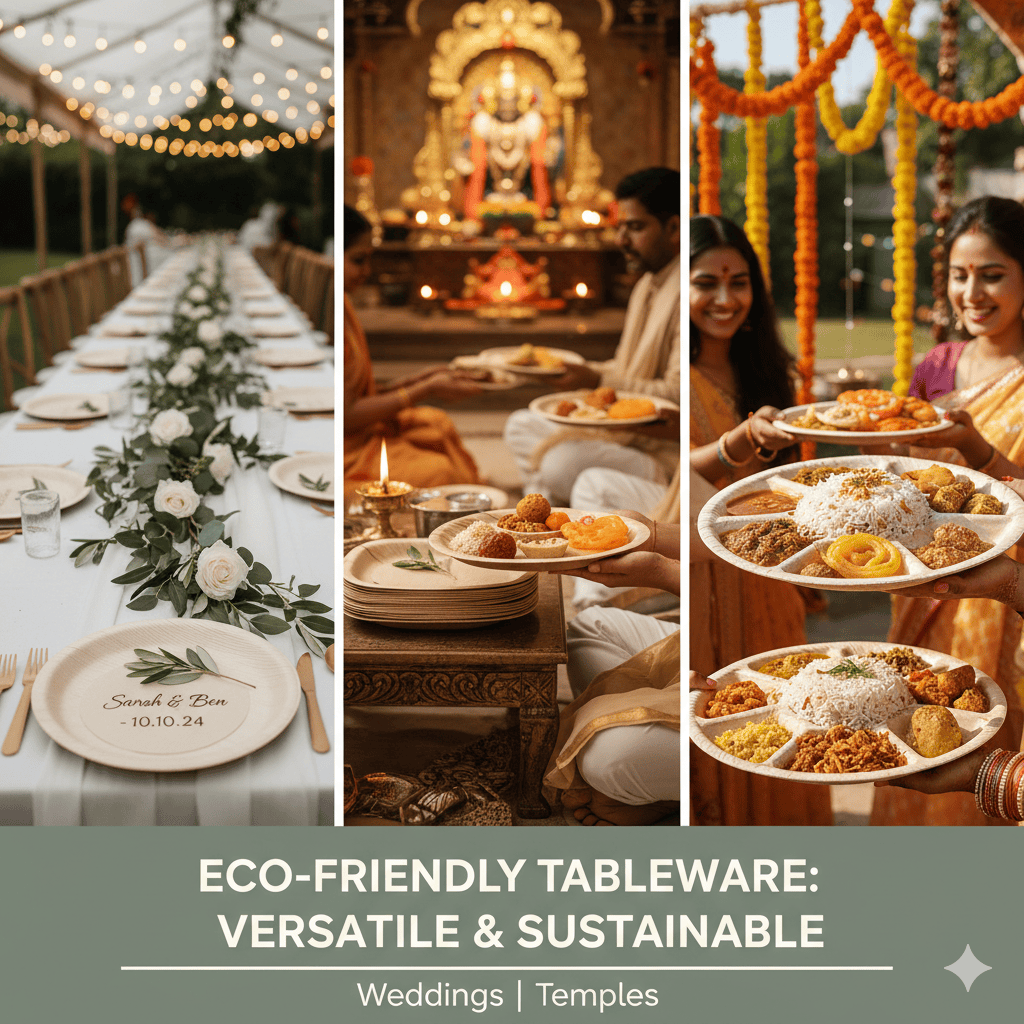
In corporate events and conferences, they provide a professional, sophisticated look while also showcasing the organization’s commitment to sustainability. For picnics and casual outings, they are practical and outdoor-friendly. They are heavier than paper plates, making them wind-resistant, and they maintain integrity on uneven outdoor surfaces. In schools and community events, they are safe for children, economical for large gatherings, and serve as a teaching tool to promote environmental awareness.

In corporate events and conferences, they provide a professional, sophisticated look while also showcasing the organization’s commitment to sustainability. For picnics and casual outings, they are practical and outdoor-friendly. They are heavier than paper plates, making them wind-resistant, and they maintain integrity on uneven outdoor surfaces. In schools and community events, they are safe for children, economical for large gatherings, and serve as a teaching tool to promote environmental awareness.
Innovation and Compliance with Regulations:
The eco-friendly tableware industry is continuously innovating. Researchers are developing edible plates and spoons, waterproof paper cups made from plant-based materials, and palm fiber trays that are stronger than traditional options. These advancements are improving durability, functionality, and variety.
At the same time, increasing regulations worldwide are banning single-use plastics. India, for example, banned many categories of single-use plastic in July 2022. Eco-friendly alternatives are already compliant with these laws, making them a future-proof solution. Many products are certified under international compostability standards such as EN 13432 (Europe) and ASTM D6400 (USA), ensuring their credibility and acceptance in global markets. For exporters, this means eco-friendly tableware is not only sustainable but also market-ready worldwide.
The eco-friendly tableware industry is continuously innovating. Researchers are developing edible plates and spoons, waterproof paper cups made from plant-based materials, and palm fiber trays that are stronger than traditional options. These advancements are improving durability, functionality, and variety.
At the same time, increasing regulations worldwide are banning single-use plastics. India, for example, banned many categories of single-use plastic in July 2022. Eco-friendly alternatives are already compliant with these laws, making them a future-proof solution. Many products are certified under international compostability standards such as EN 13432 (Europe) and ASTM D6400 (USA), ensuring their credibility and acceptance in global markets. For exporters, this means eco-friendly tableware is not only sustainable but also market-ready worldwide.
Where to Buy Eco-Friendly Tableware:
Ecog Products, located at 1C Vaiyapuri Nagar, Sathy Main Road, Kurubapalayam, Coimbatore – 641107, offers a complete range of eco-friendly plates, bowls, cups, and bags. Customers can choose from bulk order options for large events, customized branding for corporate or wedding functions, and expert advice on sustainable event planning. With convenient doorstep delivery across India, Ecog Products makes it easy to switch to sustainable alternatives.
Ecog Products, located at 1C Vaiyapuri Nagar, Sathy Main Road, Kurubapalayam, Coimbatore – 641107, offers a complete range of eco-friendly plates, bowls, cups, and bags. Customers can choose from bulk order options for large events, customized branding for corporate or wedding functions, and expert advice on sustainable event planning. With convenient doorstep delivery across India, Ecog Products makes it easy to switch to sustainable alternatives.

